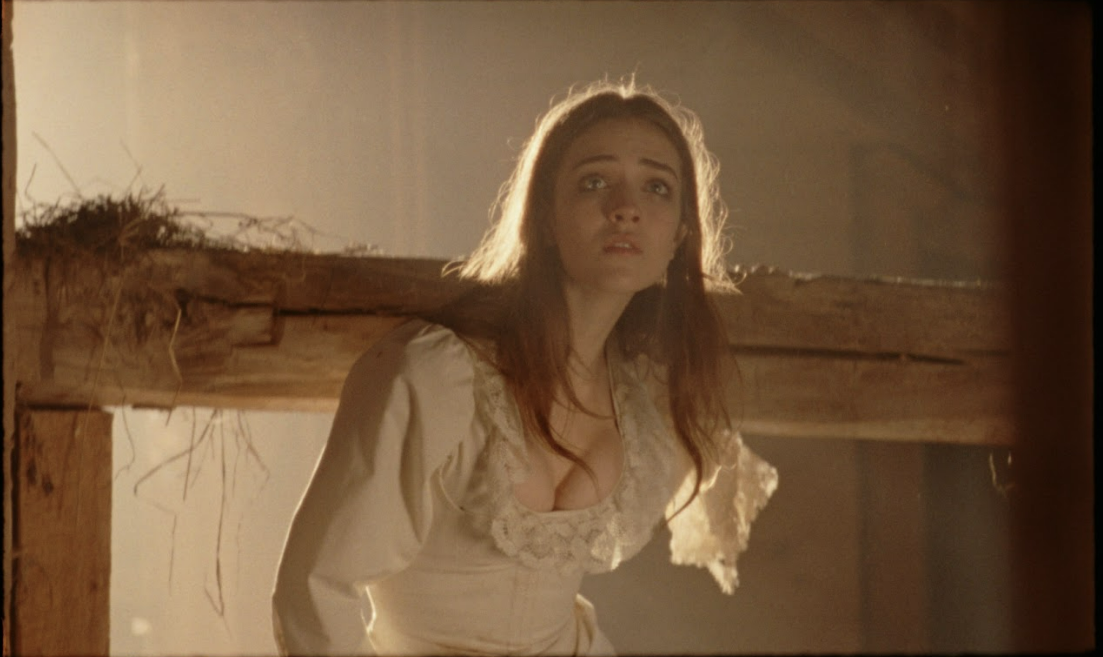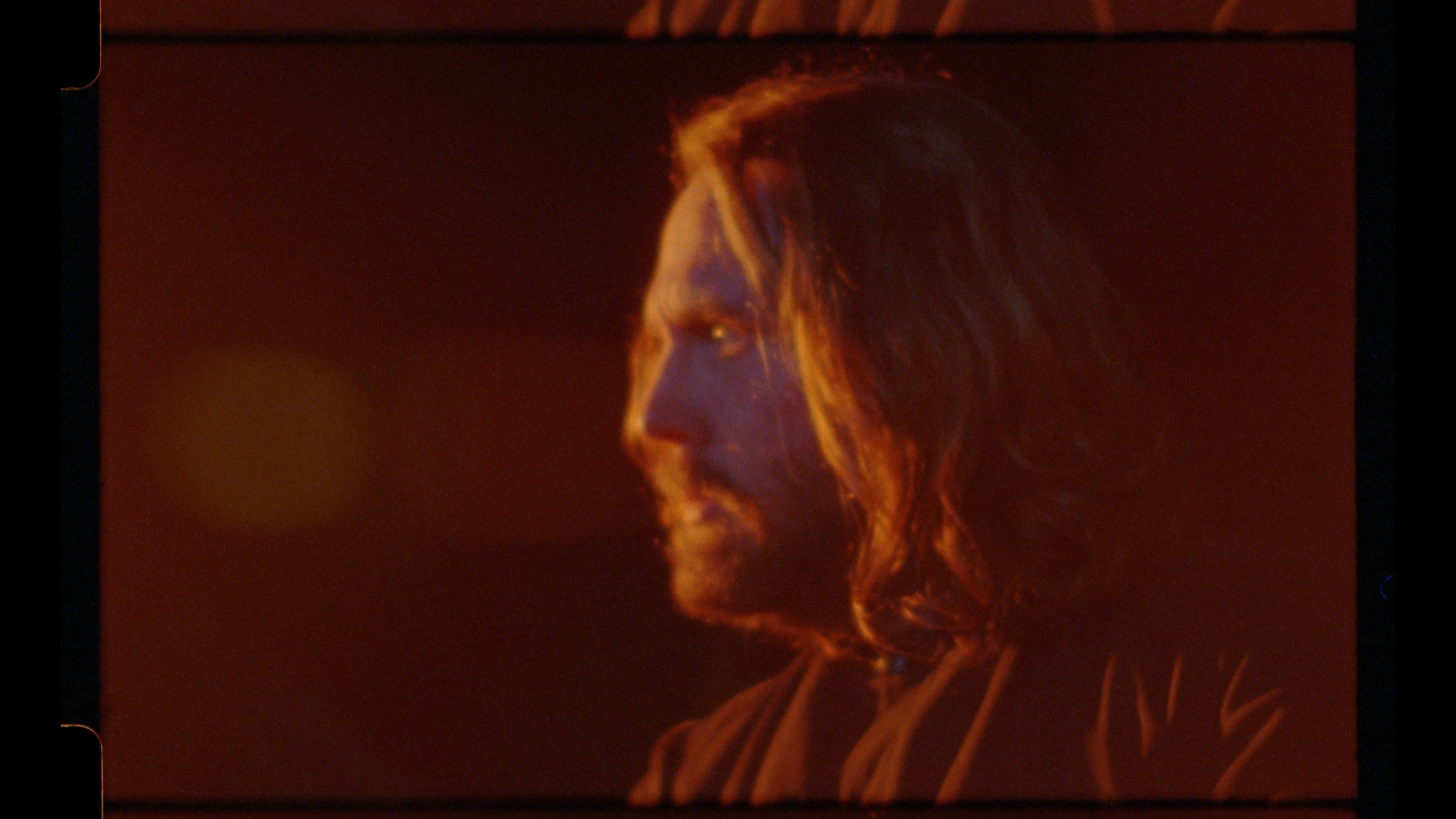
Lonesome Men in the Alps: an Interview With Nick Pinkerton
by Keegan Swenson

Talia Ryder doing her best Joker impression.
Nick Pinkerton is a film critic and programmer. He wrote the screenplay for The Sweet East. I saw it at The IFC Center. It’s currently available to stream on our favorite megacorporations Apple and Amazon. I was hit by a car while riding a Citi Bike a few minutes before the two of us chatted about his movie.
Nick Pinkerton: A few years ago, a car very nearly clipped me. And I did the usual thing where I'm like, “What the fuck?” The guy pulls over and is saying Come get it bro. Homie, you don’t get to do that. You’re the guy who almost hit me with your car. You really don’t have a leg to stand on here.
Keegan Swenson: You’re the murderer in this situation.
NP: Our grievances are not equivalent in this situation. My one and only life is potentially draining out of my body into the gutter after a collision.
KS: Your movie made me laugh. I can’t stop thinking of Earl Cave’s pierced penis. That’s Nick Cave’s son?
NP: That is Earl Cave, yes. He gets a lot of mileage in the Q&A’s from a joke that we're all so tired of now where he's like: “They cast me because that's my real dick.” And yeah, the first 25 or so times, we all mildly chuckled. Now it's a real eye roller.
KS: Is that something that's in the script in an early draft? Are you adding a lot of these ideas and images as you're going along? Was that in your head?
NP: The architecture of this script was in place fairly early. That is to say, the major characters and various movements didn't change a lot from 2017 to when we actually started to shoot in fall of 2021. But there were a number of little nip-tucks that went on throughout. There were bits of dialogue that were added throughout the shooting. With Jeremy [O. Harris] and Ayo [Edebiri], there’s a fair amount of improv over and above what was in the script. And at this point I've kind of lost track of what came in where. But I will say, if you look at probably the earliest drafts of the screenplay, all of the basic elements are in place pretty early on, including the massively pierced cock.
KS: How important is it that Earl Cave’s character is a rich kid? Is that more of a throwaway line, or is that something that is integral to his character?
NP: That's a great question because I've seen certain responses to the movie, which really seize on that and make that out to be some kind of commentary on the contemporary left...

Jeremy O. Harris (left) and Ayo Edebiri (right) playing ambitious East Coast filmmakers.
NP: ...And in point of fact, that was all written the day before we shot. The only reason I added that bit is when Earl got on set, his American accent was just… hard to place... He didn't register as an Englishman, but his accent was a little off-the-map, so after watching the first day of shooting with him, I knew there had to be some explanation for that. And very often people who have these weird floating untraceable accents are people who were attached to the diplomatic core when they were kids: that’s why Christopher Lambert sounds the way he does. I shouldn't like to say this in such a way that makes it sound like Earl doesn't give a good performance, because I like his performance very, very much. Anyways, subsequently people picked up on this as some kind of cutting commentary, but really it’s just me responding to things on the shoot, on the fly.
KS: Right, it’s a very practical decision on set and then posteriori critical analysis makes it sound like it was a plan all along. Could you see a more straightforward feminist reading of Talia’s [Ryder] character? As she goes through these different subcultures, she has a lot of men pushing their ideological worldviews onto her.

Talia Ryder as Lillian.
NP: It’s certainly steeped in all sorts of ideologies, but I think of it as being a rather more character driven piece. To give one example there have been certain critiques advanced that dwell on the fact that Simon's [Rex] character gets a great deal of screen time and feels at least to some viewers disproportionately represented. And to some eyes this means his character, of his character’s worldview, is being validated or endorsed by the movie, which leads some people to a certain ideological reading of the film. To my mind, the reasons we linger with Simon are very pragmatic. Very practical. Talia’s character is from a shitty, cramped trailer park, and suddenly she gets to stay in this large house and have a lot of time to herself. As simple as that.
KS: It’s a pretty nice deal for her.
NP: Yeah. When people attempt an allegorical reading or expect some sort of thesis statement buried in it, or ask what the movie’s about, my response is: it’s literally about a girl on a senior class trip to Washington DC who gets separated from her class. It’s about exactly what it appears to be about. Certainly I think it's suggestive of other things and there's, I hope, a lot of ideas flying around. But more than anything, it's just meant to be a ripping yarn.
KS: When thinking of the character of Lillian [Talia Ryder] I kept returning to Heiddeger’s concept of Geworfenheit. He describes the human experience as being thrown into existence. Lillian doesn’t read as vapid to me as some critics have said, but just like anyone her age she is dealing with this thrownness in her own way. She can be very cutting to Simon Rex’s character.

Dirt Nasty A.K.A. Simon Rex.
NP: We were in Washington DC with the movie last weekend and somebody asked about the “emptiness” of Lillian’s character. And my response was: no, it’s everyone around her who is constantly disgorging themselves for her, and that, to me, is a terribly empty way to be. You're just spilling your contents constantly. Whereas she is somebody who is very pragmatic, even stoic. Keeps her cards close to the vest and analyzes situations in a very clear-eyed fashion. She understands the particular hangups of the people she’s dealing with and is willing to, up to a point, indulge them.
KS: And also keeps certain aspects of herself to herself.
NP: Right. I hope that the movie, to some degree, honors the privacy of the character, and that to me is something very different from a lack of character. And I think particularly 'cause we live in such an oversharing time that if somebody isn't constantly dumping their guts out, that is taken as a sign of a sort of absence of character. I was saying to Sean [Price Williams] the other day that Talia is like John Wayne in this movie.
KS: Teenager John Wayne travels America.
NP: She isn’t on a constant round of emotional purging. There's depth in reservedness.
KS: When Lillian gets in with the Muslim brotherhood in rural Vermont Rish Shah’s character has that great line where he asks her “Is everything just a joke to you?” I think it fooled me into liking the character for a beat, that he was pushing back against this archetype of someone with a purely ironic disposition.
NP: He is a somewhat backward, retrograde young man in ways, but Rish's character Muhammad, to me, is a very endearing character. It's just that at the juncture in the story where Lillian encounters him, she's sick of it all. There's something intrinsically unsatisfactory about the way the film is structured. Which I can see, as a viewer, not really cottoning to, but you can't say it's unintentional. Because the world of the film is firstly sort of expanding and expanding as Lillian's purview of the world is growing larger and larger, as she's gaining greater and greater access to things. And then after the Mohawk Valley scene, it gets very canalized and very narrow, to the point where she spends almost 15 minutes of the movie–a part of the movie where, conventional logic says, you should be upping the tempo–basically, confined to a single room, lazing around and killing time. It's perverse and perhaps not particularly satisfying for some viewers. But you can't say it's unintentional.
KS: What are some touchstones for this structure?
NP: We talked about Polanski a lot during the movie. Sean [Price Williams] and I are great fans, not so much of the films, but of him as a man. I'm kidding. At the end of The Pianist, there's a lengthy sequence where Adrian Brody is holed up in an apartment in a bombed out Warsaw. And he witnesses everything from a narrow, blown-out window. First the Nazis leaving Warsaw, then the Red Army coming in. It certainly wasn’t conscious imitation on my part, but there’s something of the last act of our movie–inasmuch as you can say–it has a last act to it–which is willingly anti-climatic, with the protagonist just holed up in a barn, subsisting on the little glimpses of life on the outside. I also thought a little bit about the sludgy, lugubrious B-side of Black Flag’s My War, funnily enough.

Nick Pinkerton on set.
KS: In your piece on The Second New Wave, you write about a sense of being consigned to the periphery, of being eternally on the outside looking in.
NP: Tracking responses to the movie, certain people read it as a deliberate provocation, thumbing its nose at one group or another. It’s an instance of an extreme disconnect between discourse and the actual circumstance in which the movie was gestated. Up until the moment the money came in, there was so little likelihood this movie would ever get made, so very little thought was given to how people would respond to it. The idea that I would spend six years of my life toiling away at something to make people I don’t know upset is pretty ridiculous. This movie was conceived in a bathysphere; there was very little expectation or anticipation that it would exist in the world at all. I have a healthy sense of my own obscurity, which leads me to first and foremost pursue the things that interest me, not for anyone else, because I don’t have any confidence that there’s an audience awaiting. If, consequently, someone else turns out to be interested, great. Before anything else, I was writing the things that interested me, and things I thought would be interesting to Sean, and be interesting to actors. The basic impetus for writing is to explain things to myself. Which allows me to, as they say, “Dance like no one is watching.”
KS: I never thought I would see Andy Milanakous in this movie. What was casting like?
NP: I can say none of the casting was done on the basis of anybody's previous work. I have to this day never seen an episode of The Bear or Euphoria, nor has Sean. I had not seen Talia in anything before. I've subsequently caught up with Never Rarely Sometimes Always. But the casting was all just done on the basis of, dare I say, vibes. In the case of Andy and Simon, both Sean and myself are fans of their musical output.
KS: One more pretentious question for you. Have you read any Henri Bergson?
NP: Bergson just came up in the Robert Hughes book on Rome that I’m reading; the chapter on the Italian Futurists, who were big Bergson-heads.
KS: Bergson wrote ‘The obscurity is cleared up; the contradiction vanishes, as soon as we place ourselves along the transition, in order to distinguish states in it by making cross cuts therein thoughts. The reason is that there is more in the transition than the series of states, that is to say, the possible cuts—more in the movement than the series of position, that is to say, the possible stops.’ That made a lot of sense in how to view The Sweet East, to me.
NP: People have called it a road movie and a coming-of-age movie, but neither really fit exactly. There's probably cumulatively a minute and a half of people actually, you know, in transit, on the open road. It's more of a stopover movie than a road movie. And as for coming-of-age, I don't think that process perhaps is ever complete for any of us, but it is certainly not complete for Lillian. There’s a kind of emergence from the chrysalis at the end, but the significance of that is left up to the spectator. It’s a narrative of constant flux.
KS: Flux and metamorphosis.
NP: In the walk and talk scene toward the end with Rish… Nobody's ever asked about this, so I'll just spill it. Lillian says something to the effect of “I spin myself into a cocoon and only time will tell if I become a butterfly or a maggot.” Nobody's ever asked the source of that. It is the German Romantic painter, Caspar David Friedrich, which, of course, Simon's character being a neo-Nazi, would just eat his work up, and love those images of heroically lonesome men in the Alps, contemplating eternity and Aryan destiny.
KS: The later line where she says she knows more about moths than most people is a nice touch. What are you working on now?
NP: Well I should mention, I also have the second issue of my magazine Bombast going to the printer as we speak which is 160 pages long, about 70 of those pages have original illustrations. A real labor of love. As, of course, is everything I do.

Keegan is a Fiction MFA candidate at the New School. He edits interviews for Forever Magazine.
Nick Pinkerton is a freelance journalist and film programmer. He has written about films for Sight & Sound, ArtForum, the Village Voice, Moving Image Source and Reverseshot.com, among other publications. He is currently a member of the New York Film Critics Circle.

